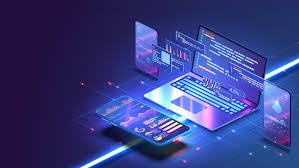Smartphones have become an indispensable part of our lives, offering convenience and connectivity at our fingertips. This influence has extended to the healthcare industry, with a surge in the development of Mobile Health Apps (mHealth Apps).
Why mHealth Apps Are Booming
The growing focus on fitness and the widespread use of wearables like smartwatches have driven the demand for mHealth Apps. These apps empower users to manage their health and wellness directly from their phones, fostering a culture of self-care and preventive healthcare.
The mHealth Market: A Lucrative Landscape
According to Statista, the mHealth market is expected to surpass a staggering $59 billion by the end of 2020. This immense growth highlights the increasing reliance on mobile technology to improve healthcare accessibility and efficiency.
Benefits of mHealth Apps: A Win-Win for Patients and Providers
mHealth Apps offer a multitude of benefits for both patients and healthcare providers:
- Increased Efficiency: Doctors and patients can connect virtually, eliminating the need for physical appointments and reducing travel time.
- Improved Management: Medical apps automate tasks, minimize paperwork, and ensure better organization of health data.
- Enhanced Convenience: Patients can access medical records, schedule appointments, and refill prescriptions anytime, anywhere.
- Reduced Costs: Virtual consultations and remote monitoring can potentially lower healthcare costs for both patients and providers.
Essential Considerations Before Developing a Healthcare App
Before embarking on mHealth app development, it's crucial to consider several key factors:
- Idea Validation: Thoroughly assess the feasibility and market need for your app concept.
- Target Audience: Identify your primary users - doctors, patients, or both - to tailor features and functionalities accordingly.
- Platform Selection: Choose the development platform (Android, iOS, or cross-platform) based on your target audience and desired reach.
- App Functionality: Determine the specific healthcare needs your app will address, such as appointment booking, medication reminders, or fitness tracking.
Must-Have Features for a Successful mHealth App
To ensure a seamless user experience, your mHealth app should incorporate these essential features:
- Simple Registration: Opt for a straightforward registration process, potentially integrating with social media platforms like Gmail or Facebook.
- Secure Payment Gateway: If your app offers in-app purchases or online payments, ensure a secure and reliable payment gateway.
- Geolocation: Consider location tracking to provide users with relevant information based on their region and time zone.
- Push Notifications: Utilize push notifications to remind users about appointments, medication schedules, and health updates.
- Rigorous Testing: Implement a comprehensive testing strategy to identify and eliminate any bugs or errors that could compromise data security or user safety.
Data Security: A Top Priority in mHealth
mHealth Apps handle sensitive patient information, making data security paramount. Here's how to ensure user trust:
- Compliance with Regulations: Adhere to the latest data security and privacy regulations to safeguard patient information.
- Advanced Encryption: Employ cutting-edge encryption techniques to protect data from unauthorized access or breaches.
- Blockchain Integration: Consider integrating blockchain technology for its enhanced security features and tamper-proof data storage capabilities.
Future Trends in mHealth App Development
The mHealth landscape is constantly evolving, with exciting trends shaping the future of healthcare:
- Patient-Generated Health Data (PGHD): Empowering patients to actively participate in their healthcare by collecting and sharing their health data.
- AI and Machine Learning: Leveraging AI algorithms to analyze data, identify patterns, and predict health risks for proactive interventions.
- Virtual and Augmented Reality (VR/AR): Utilizing VR/AR for medical education, surgical training, and patient rehabilitation with immersive experiences.
- Internet of Things (IoT): Integrating wearable devices and sensors with mHealth Apps to collect real-time health data and personalize healthcare interventions.
The Future of Healthcare is Mobile
The mHealth revolution is transforming healthcare delivery, offering greater accessibility, convenience, and personalization. By embracing mHealth App development, healthcare providers and organizations can enhance patient care, improve operational efficiency, and contribute to a healthier future.
Ready to develop your innovative healthcare app?
If you're looking for expert guidance and development services, look no further than Tech Xpert - App Building Agency. We are a leading digital product development company with extensive experience in crafting exceptional mobile applications. We can help you translate your healthcare app idea into a reality that revolutionizes patient care. Let's connect and discuss your vision!


No comments yet